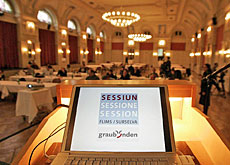Parliamentarians meet in mountain arena

The autumn session of parliament has opened and for the first time is being held in a mountain village, the southeastern resort of Flims.
The three-week meeting is focusing on a wide range of issues including army reforms, health, energy and taxes, as well as foreign affairs.
It is only the third time in the history of modern-day Switzerland that a parliamentary session is taking place outside the capital Bern.
In 1993 politicians met in Geneva (French-speaking part), 2001 in Lugano (Italian-speaking region) and now in Flims in a region in southeastern Switzerland where the minority language Romansh is spoken alongside German and Italian.
The primary reasons for the current session to be held outside the capital are major renovation work underway at the parliament building in Bern and a decision to pay tribute to the fourth national language.
Some of the debates will also be translated simultaneously into Romansh, which is spoken by about 50,000 people in the country.

More
House of Representatives
Army and EU
A proposal to adapt army reforms to move the focus of the country’s militia army away from strictly territorial defence is one of the more controversial issues to be debated. It is the latest in a series of moves to change the country’s military structure, which have included major cuts in troop numbers.
Apart from next year’s army procurement programme the parliamentarians will also discuss calls to abandon a traditional concept whereby members of the militia army are expected to keep their rifles and ammunition at home.
There are about two million firearms in circulation in Switzerland.
In foreign affairs, both the House of Representatives and the Senate are due to discuss a government report on European policy. The document, which was published in July, confirms the current bilateral approach as realised in a series of 16 different bilateral treaties since 2002.
However, the cabinet has not ruled out full membership of the European Union at an unspecified date in the future despite pressure notably by the rightwing Swiss People’s Party.
Currently only the centre-left Social Democrats – one of four parties in the government – are still in favour of Switzerland seeking EU membership.
Social security, education
The three-week session will also see parliament tackling the latest proposals to cut spiralling costs in the health system.
There are plans for a new scheme to finance healthcare notably at home and in old people’s institutions and calls to effectively bar certain doctors and reduce the services covered by insurances.
In another development, the cabinet faces pressure by the cantons – which enjoy a large degree of autonomy – and education experts to boost spending on research from 4.5 per cent to up to eight per cent annually.
It is also likely to have to present plans for increased cooperation within the federal administration, in particular by merging education, research and vocational training into one ministry.
swissinfo, Urs Geiser

More
Senate
Flims is a mountain resort in southeastern Switzerland with a population of about 2,800.
The village is a mixed-region where both Swiss-German dialect and the Sursilvan dialect of the minority language Romansh are spoken.
The session takes place in a luxury hotel compound which has been converted to house assembly rooms for the two parliamentary chambers.
Estimated costs for the event: SFr1.9 million ($1.5 million) funded jointly by the federal, cantonal and local authorities as well as private sponsors. The federal authorities for their part earmarked SFr1.7 million the special session.
The Swiss parliament normally meets for times a year for a three-week session in the capital, Bern.
Until 1848, the founding of modern-day Switzerland, the cantons used to take turns to host the assembly. The spa at Baden, between Zurich and Bern, was one of the most popular venues.
The Swiss parliament is made up of the House of Representatives (200 members) and the 46-strong Senate representing the country’s cantons. Both chambers have equal powers.

In compliance with the JTI standards
More: SWI swissinfo.ch certified by the Journalism Trust Initiative


You can find an overview of ongoing debates with our journalists here . Please join us!
If you want to start a conversation about a topic raised in this article or want to report factual errors, email us at english@swissinfo.ch.